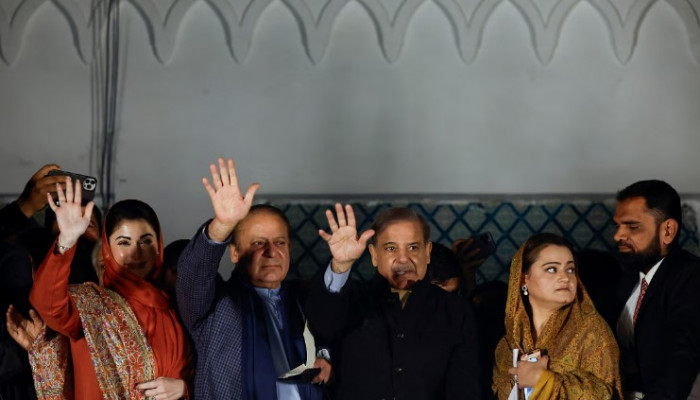Shehbaz Sharif set to become next Pakistan PM, with Maryam Nawaz in line for CM of Punjab
- In Reports
- 11:11 AM, Feb 14, 2024
- Myind Staff
The Pakistan Muslim League-Nawaz has announced Shehbaz Sharif as its prime ministerial candidate, a surprising departure from the expected candidacy of party supremo Nawaz Sharif. The nomination was made public by PML-N spokesperson Marriyum Aurangzeb.
Additionally, Nawaz Sharif has put forth his daughter Maryam Nawaz as the nominee for the position of chief minister of Punjab province. This announcement follows the withdrawal of Pakistan Peoples Party chairman Bilawal Bhutto-Zardari from the prime ministerial race.
He declared that his party would back Nawaz Sharif without joining the new government. It is widely believed that the powerful Pakistan Army is in support of the Pakistan Muslim League-Nawaz. Bilawal Bhutto-Zardari acknowledged that his party lacks the mandate to establish a federal government.
Previously, Shehbaz Sharif had confidently stated that Nawaz Sharif would assume the prime ministerial position for a historic fourth term. Shehbaz extended his thanks to Bilawal and his father, Asif Ali Zardari, for their support towards Nawaz Sharif. The PML-N and the Muttahida Qaumi Movement-Pakistan have also reached an agreement to advance with mutual cooperation.
Khan rejected the notion of forming a coalition government with any major political parties in Pakistan. He cautioned his political opponents against forming a government based on 'stolen votes'. Bilawal expressed his aspiration to witness his father, Asif Ali Zardari, return to the presidency once again.
Zardari held the presidency from 2008 to 2013. Bilawal emphasized Zardari's capability to address the current crisis in the country and urged all political factions to prioritize national interests and halt divisive politics.
For a party to establish a government, it must secure 133 seats out of 265 contested seats in the 266-member National Assembly. In the recent Pakistani elections, no single party succeeded in obtaining enough seats to form a government, resulting in a hung parliament. Nawaz Sharif's party, the former Prime Minister, clinched 75 seats, while Bilawal Bhutto Zardari's party garnered 54 seats.
Independent candidates, backed by imprisoned former Prime Minister Imran Khan secured 93 seats. Imran Khan's party plans to collaborate with two rightwing religious parties to form governments at the federal level and in the provinces of Punjab and Khyber-Pakhtunkhwa.
Negotiations for coalition formation are ongoing among these parties and smaller factions. The National Assembly, Pakistan's lower house of parliament, has a total of 336 seats, with candidates contesting for 264 seats. Additionally, there are 70 reserved seats, 60 for women and 10 for non-Muslims.
Once the caretaker government overseeing the election steps down, power shifts to the new government. Parties get reserved seats based on their share of votes, but independents can't get these seats unless they join a party.
Image source: The Print







Comments